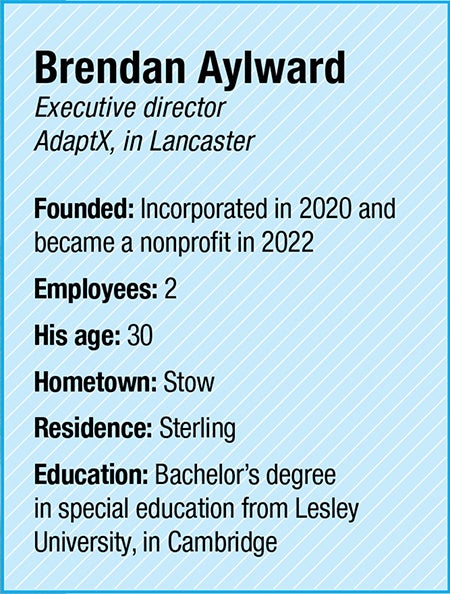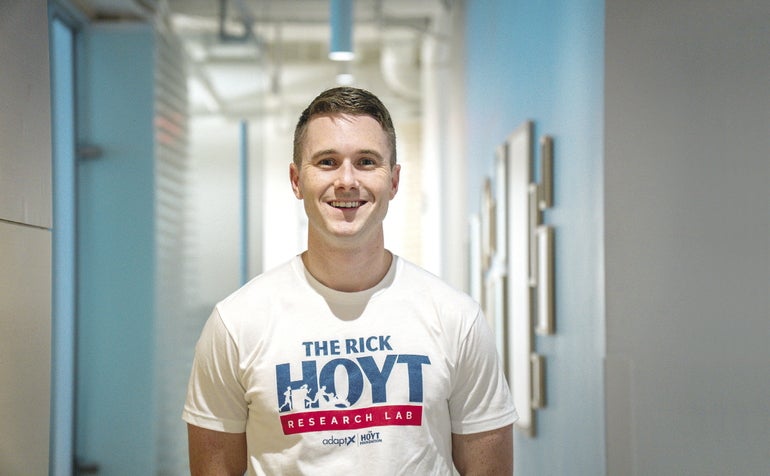Brendan Aylward first started volunteering for the Special Olympics as a teenager in high school. After years of volunteering with the organization, Aylward found purpose and passion working in the adaptive fitness industry.
Get Instant Access to This Article
Subscribe to Worcester Business Journal and get immediate access to all of our subscriber-only content and much more.
- Critical Central Massachusetts business news updated daily.
- Immediate access to all subscriber-only content on our website.
- Bi-weekly print or digital editions of our award-winning publication.
- Special bonus issues like the WBJ Book of Lists.
- Exclusive ticket prize draws for our in-person events.
Click here to purchase a paywall bypass link for this article.
Brendan Aylward first started volunteering for the Special Olympics as a teenager in high school. After years of volunteering with the organization, Aylward found purpose and passion working in the adaptive fitness industry. Today, his nonprofit AdaptX focuses on training fitness professionals on how to assist those with special needs working to meet their fitness and health goals. Advocacy and inclusivity are at the root of AdaptX’s mission.

What inspired your involvement with AdaptX?
I opened Unified Health and Performance, my for-profit, brick-and-mortar fitness facility in 2016, and the idea for AdaptX evolved from that and became a separate nonprofit. AdaptX is predominantly an educational-and-advocacy company striving to make the fitness industry more accessible for all.
Initially, I was creating educational materials for my coaches and our interns, and it just kept growing until it became a significant-enough course I could share with others as well. The mission of AdaptX is to address some of the primary barriers to better health and fitness for people with disabilities, which are often a lack of opportunities, inaccessible training environments, and a lack of education and understanding from fitness professionals. So that's why we teach the course The Fundamentals and Theories of Inclusive and Adaptive Fitness.
Have you always been passionate about the inclusive fitness industry?
My first introduction to disability was through the Special Olympics when I was 15. There was a program our school district started called Unified Basketball, and my parents recommended I volunteer. I was immediately hooked and soon took over running that program. Even through college I came home every weekend to coach. I coached the USA games for Massachusetts and then I ran strength conditioning for some of the sports leading up to the World Games for Special Olympics USA. The Special Olympics and Best Buddies International were two foundational experiences that influenced my career path. Initially, I was interested in special education, but halfway through university I decided I wanted to open a fitness center for people with disabilities, instead of working in the classroom.
How does AdaptX advocate for athletes with special needs?
Our main offering is the course we teach online in a self-paced, asynchronous model. When I work with larger groups, we’ll do cohorts where all a fitness center’s staff will go through the course, and we’ll add some live presentations. This spring we will be training YMCA staff throughout Massachusetts, New Hampshire, and Milwaukee. The course is available online for independent trainers who are interested in improving their knowledge of inclusive fitness topics since these subjects are not covered in standard exercise science curriculums or personal trainer certifications.
AdaptX addresses the lack of knowledge and gap existing in educational experiences for trainers. It is a train-the-trainer model. We are always trying to brainstorm ways to make the fitness environment more accessible for everyone.
Is the market for this model of a fitness center growing?
It's definitely growing. It is getting more publicity. For example, the Paralympics were just televised for the first time on NBC. CrossFit has been leading the charge and incorporated more adaptive athletes into its competitions. The course we teach at AdaptX is geared toward private fitness studios or strength conditioning facilities. But adaptive fitness is increasingly becoming more popular and more present.
What are your plans for the future of AdaptX?
My goal is to have a small blueprint on as many fitness environments as AdaptX can reach, and I want my work to benefit as many people with disabilities as possible. The way we've identified to do that is to work with the trainers themselves. We’re researching how trainers improve their confidence and competence before and after taking the course.
We have the Rick Hoyt Research Lab – named in honor of famed father-son Boston Marathon duo Rick and Dick Hoyt – here at our facility in Lancaster, which focuses on cerebral palsy research. Our commitment to the educational piece includes being involved in research. We've even worked with people in New Zealand, Australia, and in different states. It never ceases to amaze me when I have the opportunity to work and share research with institutions outside of Massachusetts. Ultimately, our goal at AdaptX is to create the best educational resource in the world on adaptive fitness.
This interview was conducted and edited for length and clarity by WBJ Correspondent Sloane M. Perron.

